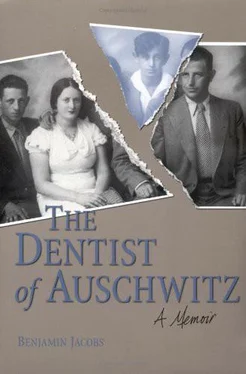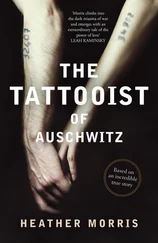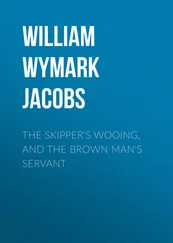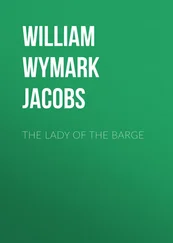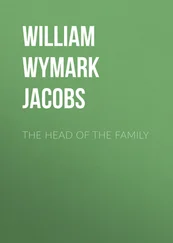Then I recognized on my right Wigdor Celnik, a friend of my sister’s. Next to him stood Jan Kozlowski, a Pole of questionable character from Dobra. He had been jailed several times. “One would do well not to have anything to do with him,” I had heard people say. The third, Pavel, I knew only by name. The fourth was a stranger. I thought Celnik might be there because of his having once been a representative of the Bund, a Jewish socialist labor organization. Was I arrested because of my membership in the Zionist youth organization Hashomer Haklal Hazoni? [1] During the interwar period, Jews living in Poland, especially my generation, were attracted by the Zionist ideology, Herzel’s “Judenstaat,” the idea that one should not wait for the Creator to send a Messiah to return his people to the homeland but should advance that conviction by working for a homeland in Palestine.
I had not known anyone arrested for that offense before.
I asked Wigdor why he was arrested. “What did they say to you?” he whispered back.
“I heard them saying that I’d be shot.”
“Me too,” he replied.
Suddenly one of the guards yelled at us, “Shut up!” as he cocked his gun.
I wasn’t ready to die. Why was I here? Was it God’s will, as people sometimes say? If this is my fate, I thought, what can I do to make the agony of dying easier? I tried to convince myself that I had lived what was to be my life. After all, no one lives forever. I tried hard to persuade myself, but that didn’t make much sense, and it wasn’t very consoling, but it was the best I could do. All of us were puzzled. Without knowing why we were there, we exchanged worried looks. Even passing soldiers asked their comrades who we were and why we were under arrest. The guards didn’t know either.
After two hours a sergeant came over and ordered us to follow him. We went a few hundred meters down the road and came upon odd-looking rigs—three shallow carts with huge wheels that had six Belgian horses hitched to them. We were ordered to board. The sergeant and guards followed. As we left the army compound and headed out of the village, I spurred my courage and asked the sergeant where he was taking us. He did not answer. He seemed surprised that I had asked him. Wigdor Celnik, who was on the same wagon, looked at me as if to say, “Did you expect him to tell you?” Discouraged, I asked nothing further.
After a while we veered off the road into a gravel pit. Why did they bring us here? I wondered. A gravel pit that is constantly dug in would hardly be suitable for a burial place. The sergeant then got off and ordered us to fill the wagons with gravel. That still did not make sense. After a couple of minutes the sergeant looked around carefully. He whispered to me, “You will not be shot.” Then he uttered the name of a dentist in Dobra, Krusche.
I only knew Krusche by name. I knew that he had come to Dobra a couple of years before. He was the only dentist in the village. People did not say bad things about him. “He is a cross between a decent Pole and a decadent German,” I had heard. When the Germans came to Dobra, he quickly rose to prominence in the Nazi aristocracy.
I was overcome by a sensation of having been born all over again. I passed the news to Celnik, and he relayed it to the others. We began fill the wagons with fury, as if to avow our usefulness to our adjudicators, thanking them for saving our lives.
At the first opportunity I asked the sergeant what Krusche had to do with my arrest. “I can’t tell you here,” he said uneasily. “Give me the address where I can find you, and I’ll come to see you.” I gave him directions to the school, and he promised to come.
We filled the carts with gravel in record time. By five o’clock, after ten loads, the gravel had piled up in the yard of the army compound. Without indicating to any one of us the reason for our arrests, the Germans released us.
I thanked God over and over and quickly disappeared from their sight. Once on the road, I ran as fast as I could. When I reached home, out of breath, Mama’s face lit up. Seeing me, her agony was replaced by joy. She had already been to the Jewish councillors, I learned, begging them to find out why I was arrested and pleading with them to intervene. In contrast, Papa believed it had been a mistake all along. A few days later I heard that Kozlowski was arrested once more. No one ever saw him or heard from him again. The rumor was that he died in some camp.
At dusk I wondered if the sergeant would keep his word. After a while I saw someone resembling him coming down our street, checking house numbers. When he saw me, he came up close and whispered, “I have to be very careful.” He quickly entered the school with me. When I introduced him to my family, he gave his name as Sergeant Sprengle. He begged us not to tell anyone he had come into our room. Then he told me that because of Krusche’s complaint, Schweikert had ordered my arrest. Krusche insisted I had practiced dentistry here, depriving him of his income. All this, of course, was a lie. Few Poles were conscious of dental care, and most were too poor to spare the money for it. Even after losing their natural teeth, they didn’t see the need to get false ones.
Before long Sergeant Sprengle developed a friendship with us and came to see us almost every day. At first we were cautious of him, but in time we learned to trust him. He seemed to lack the anti-Semitic venom that characterized most Nazis. One had to wonder about him as a member of a superior race. Sprengle was an odd young man. Of medium height, he had very short legs, almost to the point of abnormality. His typically German light hair was in a military crew cut that looked as stubby as a badger’s bristles. The tanned reddish skin over his square jawbones made his face look as if it were cut out of a redwood log. Seeing him, one couldn’t escape the thought that he might be trapped in a role that didn’t fit him.
Sometimes he brought us German newspapers. Of course they were full of the usual anti-Semitic propaganda, which portrayed us as devil-faced Lucifers and as disease-spreading, unsociable villains of society. Two things we never talked about were nazism and politics. The sergeant often warned us to leave. “We won’t do you much harm, but those who follow us will make your life very difficult,” he muttered.
When the Germans invaded France in May 1940, they made light of the Maginot Line, calling it a picket fence. A few days later we read that France had surrendered and Hitler had celebrated the victory in Paris. Shortly after that Sprengle’s company was transferred west. By then we were so fond of him that we genuinely missed him. Although he promised to write, we never heard from him again. As the first German troops were replaced with new ones, more discriminatory laws were piled on our backs. Jews had been barred from associating with any other race. The Aryans shall be spared the impurity of Jewish blood, the laws said.
By the summer of 1940 the vise around us tightened even more. The Nazis decided to clear Dobra’s slums and create a ghetto there. Some of the poor Jews who had lived there for years could only keep one room. They had to give the rest to other families. We had to move out of the school and were given a room with a dirt floor. We came to realize that even our cramped quarters had had advantages. By then our home was just a distant memory.
The ghetto rations were our only source of food, and hunger became the number one enemy. Butter, milk, sugar, and flour were almost never available. Even though we were ready to part with anything to win another day of life, those who came to trade with us, masquerading as do-gooders, did so mostly for personal gain. Because we had fewer and fewer tradable goods, in time the merchants stopped coming.
Читать дальше
